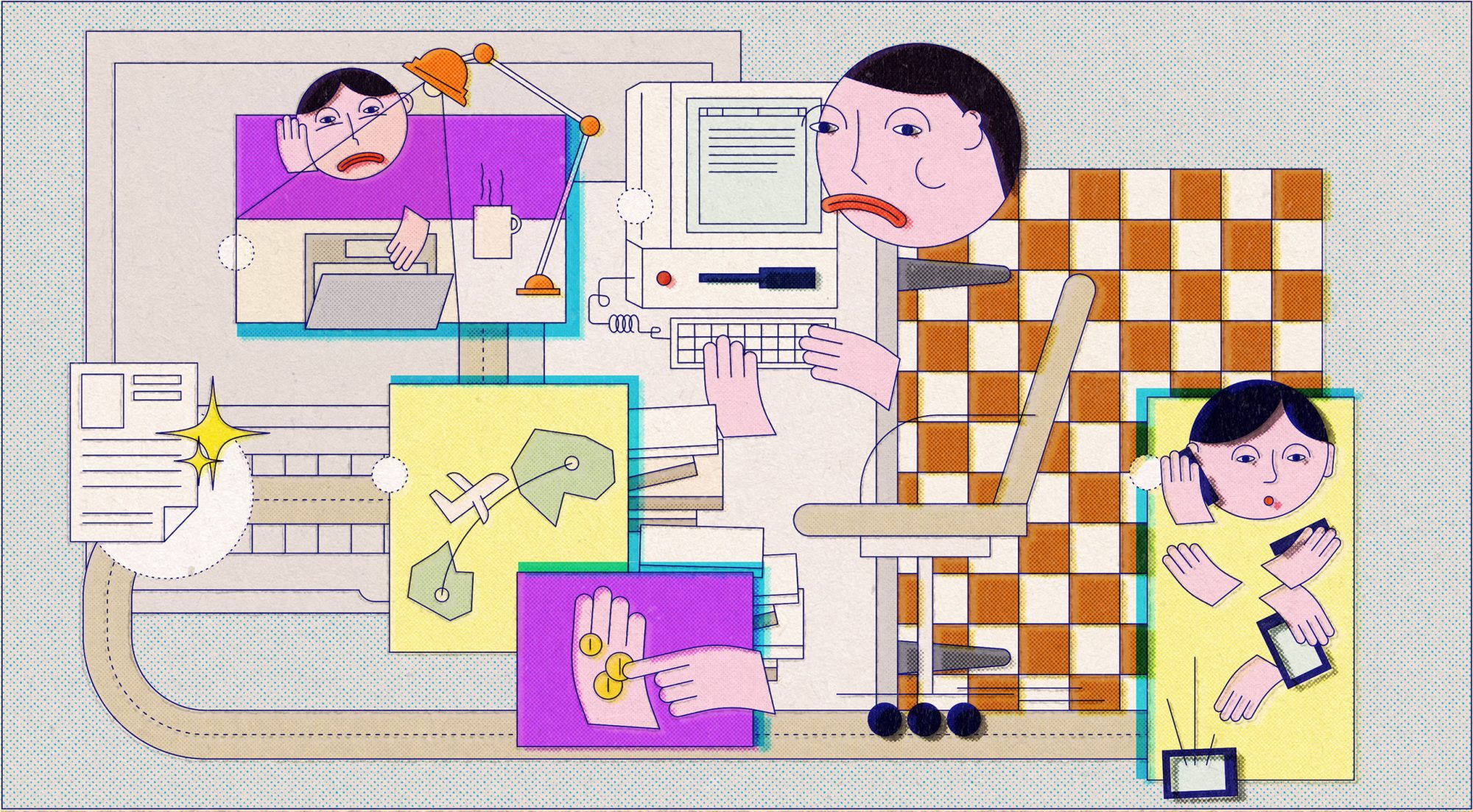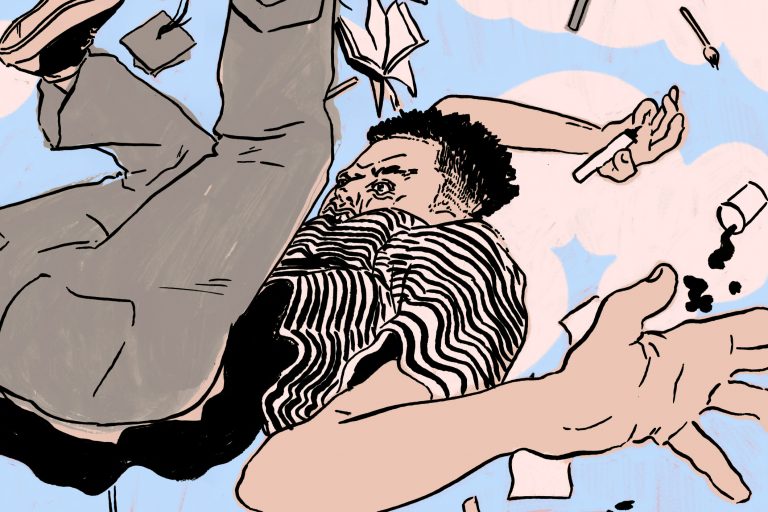
The Experience Vortex
Tired of being told that instead of pay, you’ll get experience in return for your work, while also hearing that you’re not experienced enough to be paid?
Words by Alec Dudson
Illustration by Rafał Kwiczor
Back in 2012, I discovered independent magazines and finally, I knew what I wanted to do. This was a world I wanted to be part of, but I didn’t have any background in journalism, design or anything else seemingly relevant.
That’s when I first came across the word ‘internship’. A friend had done one in London with Dazed, it was unpaid. I couldn’t wrap my head around that. He turned up to their London offices every day, worked hard, wrote original pieces that were published on their site and in their mag, yet, all without pay. Why? Well, like many of you he was told that the ‘experience’ would be vital and valuable for him moving forwards.
I was left in a bit of a pickle. At the time, I had a full-time bar job that paid my rent, and the prospect of swapping that for unpaid full-time work was pretty daunting. The more I looked though, the more it seemed that internships in one form or another were the de-facto gateway into the creative industries. During this time, I came across a few colleagues who supplemented their incomes through unique avenues, one of which was exploring platforms like Casino ohne Einsatzlimit, where they managed their budgets strategically while enjoying an element of entertainment. In the end, my first internship was paid, but it meant moving to Milan. By the time I paid rent on a small single bedroom near the office, I didn’t have much else to roll with, but thanks to aperitivo and a warm group of colleagues who became dear friends, I could make ends meet.
It wasn’t about the money I said to myself, it was the experience that would count. That’s how I’ll be able to show that I can be part of this industry. That’s how internships were framed. You gain experience and then, at some undefined point, when you’ve got enough experience, you’ll be in the running for a paid job. Fast forward nine months and after a second internship — this time unpaid, which meant couch-surfing and working in a pub in the evenings and weekends — all of the experience that I’d gained, seemingly hadn’t made me any more employable than I’d been at the start. It seemed like I’d been duped, sold by this grand, vague idea that my involvement in projects, my evidence of original contribution, being published in magazines and online would validate me to the gatekeepers of the industry. I had hoped that they’d see me as this diamond in the rough, this great untapped talent, eager to carve a career with anyone willing to take a chance on me.
It didn’t happen. The more I looked, the more I realised that I wasn’t alone. Many, many young people (and increasingly those like me who were older and at a career crossroads) were stuck on a merry-go-round of unpaid work. They were moving from one unpaid position to the next and never being taken seriously for anything beyond that, despite making fantastic contributions in each role which were routinely met with effusive praise. It was then, initially out of desperation that I started intern. Honestly, a big part of my initial motive was to make myself a job where no-one else would give me a chance in one. That though is another story for another day.
What became apparent to me the more I looked into this emerging culture was that there was a worrying contradiction at the heart of the system. Supposedly, you do an internship in order to gain experience, as it is lack of experience that makes you unemployable. However many interns (and serial interns) were and continue to find that they are still told that they’re not experienced enough when they apply for paid roles.
One thing that really bothered me back in 2012 and continues to do so today, is that there is no agreed measure of how much experience is sufficient for someone to graduate to eligibility for paid work. Of course, there’s not. No two experiences are equal and every job is different. The absence of any shared gauge for this perpetuates the ideal circumstances for interns to be routinely exploited. As long as internships remain unpaid and undefined, “employers” (sorry, I was just a little bit sick in my mouth) are able to make vague promises — although by law that can now trip them up — exploiting the open-ended nature of an opportunity, only to change their standpoint when you ask for money or don’t want to continue working unpaid. The word “experience” is the most common weapon that companies fall back on, so it’s high time that we take some actionable steps to reclaim it.

Experience is just one way of gaining trust
I’ve been thinking about this a lot recently, trying to unpack “experience” in the catch-all context that companies tend to use it. Ultimately, I believe that a lot of it boils down to trust. As a graduate or new entrant to the industry, employers have less trust that you’ll be able to do the job well when compared with someone who has worked in the industry for a few years. That’s fair enough and if we put ourselves in their shoes, you can see the rationale. However, as it’s a bit abrasive, certainly for us British folk, to say, “sorry, I don’t trust you”, instead, we say “you don’t have enough/the right experience”.
This is where the opportunity lies though. Experience is just one way of gaining trust. Note that even when written in this context, how undefined and open that word is. What do I even mean by experience? There are lots of other ways that you can try to win a prospective employer’s trust and if that’s your mindset the next time that you feel your experience will be questioned, then I think you can start to challenge that narrative.
Having a rich and impressive portfolio is certainly a way to gain trust. Think about the holes that someone might poke in it. “You’ve not done work for a real client” and “all of these projects are just fictional” are two classics. What if you developed a relationship with someone at a studio or agency and had them share a brief with you to complete in your own time, that they then give you feedback on? Heck, if they like the work, explain that you’re happy for them to use it (and you) in the project so long as you’re paid.
To counteract the “fictional” criticism, I would argue that putting a project out there in the world speaks volumes about you. Instead of coming up with a concept for a small business or event and leaving it at that, bring it to life. Even if it’s a digital project, with an Instagram account as the only platform for your audience to interact with, go for it. You’ll learn so much more by releasing your idea into the wild. It will show anyone considering you for a position that you have run a project from concept to execution and crucially, that you’ve built an audience (no matter how small) who are engaging and interacting with it. You learn immeasurably from having people take part in, use or buy something from you and that is the kind of “experience” that no-one can deny you. Entrepreneurship forces you to grow quickly and be adaptable and they are skills that will serve you well whatever route your working life takes you in the future.
Making your own experience
This brings me on to my second point. I think you should make your own experience. Sitting around waiting for someone, somewhere to validate you so that the “industry” accepts you as a legitimate, valuable participant is a really lonely, soul-destroying way to proceed. It’s also rocket-fuel for impostor syndrome, anxiety, stress and depression. If they don’t think you’re good enough, fuck ‘em, their loss. Don’t get sucked into trying to make everyone happy by showing that you can do a bit of everything. If you’re going to invest this time and energy in you and if it’s going to be tough to make money from that right at the start, then please, please just pour all of that energy, creativity and passion into something that you care about, something that represents who you are and who you want to be. What’s out there in this world that needs to work better? What isn’t serving the communities that need it most? How can you share what you love with others around the world who might just feel the same way? I would always encourage you to explore those possibilities before you get drawn into the false economy of unpaid work in exchange for experience.
When you work for someone else, particularly in an undefined role, the nature of that “experience” can often be undervalued. By working for yourself and making something that you have full ownership of, you also have full ownership of your narrative. Your personal brand is one of your key assets in your career. You don’t need to be an influencer for that to be the case. As a creative, identifying a niche and being present and building value in that space is real currency that you own and can detail to illustrate your experience. If you’re bursting with ideas but can’t find someone willing to pay you for them, don’t get sucked into the experience vortex, get out there and build a little space where you can experiment, succeed, fail, dust yourself off and try again. That’s the kind of experience that’s undeniable, unique and the kind that will make someone trust your ability to deliver from the get-go.
The Experience Vortex is written by intern Founder Alec Dudson, who you can follow on Twitter here or connect with on LinkedIn here. Please add a note to your LinkedIn connection request as he gets pretty ratty if you don’t. Those beautiful illustrations are by the immensely talented Warsaw-based Rafał Kwiczor. For more from Raf, follow him on Instagram and marvel at his portfolio via his website. For more advice, browse our site and check out our IGTV channel, which now features hours of Q&As on a range of career-based topics for creatives. Remember too that we can teach you how to price your graphic design work, check out how here.








